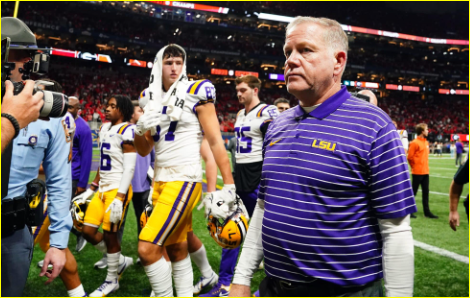The SEC is taking a firm stance against players feigning injuries to create unscheduled timeouts, aiming to ensure fair play across all its games. In a recent letter to coaches and athletic directors, SEC Commissioner Greg Sankey emphasized the need to halt all actions related to faking injuries, which can disrupt the flow and fairness of the game. This memo was first reported by Yahoo Sports and later shared with The Associated Press.
To support the crackdown, the league has strengthened its rule regarding penalties for simulated injuries. Now, if the national coordinator for football officiating deems it “more likely than not” that an injury was faked, it will be classified as a feigned injury and subject to potential penalties for the player, coach, or program involved.

Sankey urged teams to uphold the integrity of the game, stating, “Your team should be prepared to compete fairly under the rules of the game.” The SEC’s renewed focus on this issue reflects a broader commitment to minimizing tactics that exploit rule loopholes for strategic advantage, aiming for cleaner, uninterrupted gameplay.
The SEC’s updated approach to combatting feigned injuries includes new mechanisms for identifying and reviewing suspected cases. Previously, teams themselves needed to submit video evidence to the national coordinator for football officiating. Now, the SEC office has the authority to initiate video reviews when they suspect a fake injury has interrupted gameplay.
SEC Commissioner Greg Sankey made it clear that teams should manage their timeouts and clock issues within the standard rules of play. “When defending against a ‘hurry up’ offense, you are to use the allocated team timeouts if you need to stop play or you may allow the play to continue with the personnel and defensive play call in place,” Sankey wrote. He also emphasized that offenses facing an expiring play clock should either use a timeout or accept a delay-of-game penalty rather than manufacturing an injury timeout.
Sankey called these feigned injury tactics “disrespectful to the game of college football.” However, if a medical issue genuinely requires a player to stop play, teams can present medical documentation to clear any finding of a feigned injury. This change underscores the SEC’s commitment to maintaining the integrity of the game while allowing legitimate injury concerns to be properly addressed.
The SEC’s revised policy on feigned injuries introduces a structured fine and disciplinary system aimed at deterring teams from manipulating game flow. Here’s the breakdown of penalties for confirmed instances:
-First Offense: The head coach will receive a public reprimand, and the team will be fined $50,000.
-Second Offense: The head coach will again receive a public reprimand, with an increased fine of $100,000.
-Third and Subsequent Offenses: The head coach will face a public reprimand and be suspended for the team’s next game.
Additionally, if other staff members are found to have signaled or encouraged a fake injury, they will be subject to the same disciplinary actions, including public reprimands, fines, and potential suspensions.
Student-athletes involved in feigned injuries may also receive a public reprimand, underscoring the SEC’s intent to uphold integrity at every level of play. This policy aims to eliminate these deceptive tactics and reinforce fair competition across the league.
In his direct message to SEC teams, Commissioner Greg Sankey urged coaches and players to maintain the integrity of the game: “Play football and stop the feigned injury nonsense,” he wrote. This statement underscores the league’s commitment to cracking down on unsportsmanlike tactics and reinforces the expectation for teams to compete fairly. By addressing this issue head-on, Sankey aims to eliminate time-wasting strategies that disrupt the flow of games and compromise sportsmanship in college football.



